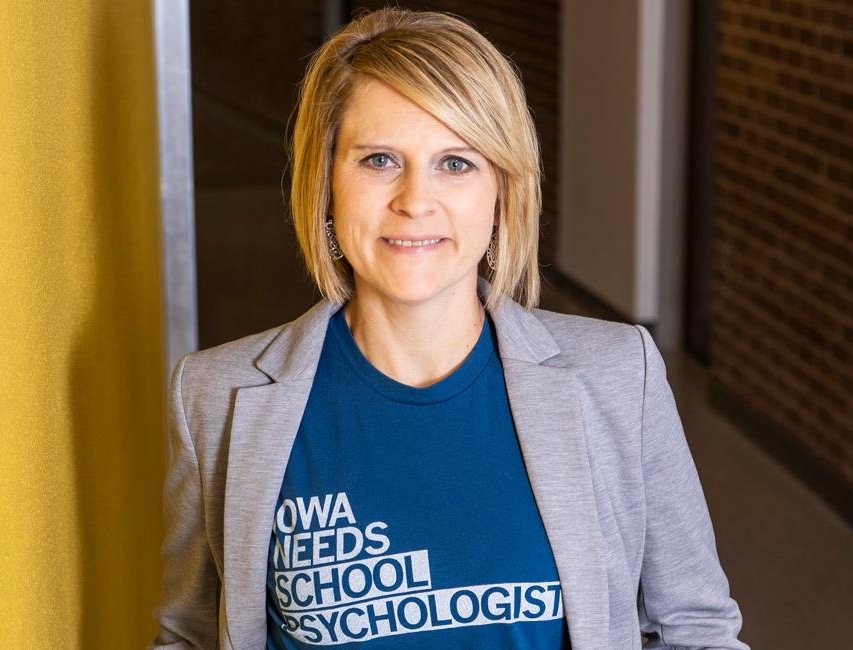Nicole Skaar

Nicole Skaar
How many years have you been working at UNI?
Ten
Briefly describe your educational background.
I have a BA from Luther College in Biopsychology and a minor in Spanish. My MA from UNI is in clinical psychology, and I have a PhD from the University of Minnesota in Educational Psychology - School Psychology.
Briefly describe your career background.
I spent 3 years working at Heartland Area Education Agency as a school psychologist before coming to UNI 10 years ago. Prior to going back to graduate school, I worked as a sleep technician in Los Angeles, CA and a research assistant in Neurology at the University of Iowa Hospitals and Clinics.
Why did you choose this career path?
It took me a while to figure out what I wanted to do for a career. I played around with medicine and neuropsychology but decided that I was more interested in psychology. Once I started the clinical psychology program at UNI, I quickly realized that I was interested in working with children and youth. I chose school psychology because I wanted to work with kids where they are rather than in a community-based clinic. I seemed to realize the barriers to mental health care early in my graduate training, which led me to school psychology.
What brought you to UNI?
I enjoyed my time as a graduate student at UNI, and I was looking to teach in a school psychology program at a regional comprehensive university. I wanted the focus of my work to be training school psychologists, which is what we do at UNI. I also liked the support the university provides for early career scholarship, and while I didn't know that when I came to UNI, it was something that certainly helped to keep me at UNI.
What's your favorite part about UNI?
My colleagues and my students! I have wonderful colleagues who support me and the program. They are wonderful to work with, and I am thankful every single day for them. We also get the best students! They work hard, soak in every opportunity to learn, and they teach me so much. I am a better school psychologist because of my colleagues and my students.
What is your greatest professional accomplishment?
It would be easy to say that working with Green Hills AEA and my colleagues at UNI on this grow-your-own program is the accomplishment that rises to the top because it has gotten the most national attention. However, the reality is that my greatest professional accomplishment is the 79 students who are now working in schools as school psychologists. Each day they are helping kids, teachers, school administrators and families.
If involved in research, what is your area(s) of interest, and what drove your interest in this area?
School mental health is my area of interest. Psychology and mental health is an area of interest that threads through my undergraduate and graduate training. The human brain is amazing, and how we behave and function in daily life is an important area of study both scientifically and practically. My interest in school mental health came along as I was learning more about school systems and the overwhelming focus on academic learning with very little focus on the social, emotional, and behavioral well-being of students. Currently, I have two grant-funded programs underway. One is a partnership with Great Prairie Area Education Agency and North Mahaska Community Schools that is in its 5th year. We have developed and implemented a school-based mental health multi-tiered system of support. We continue to improve our system and the mental health services provided to students in rural schools. The other grant-funded program is the grow-your-own school psychology program that is a partnership between Green Hills AEA and UNI. The aim is to place more school psychologists, who are mental health providers, into rural schools. I am also working with school psychology and special education faculty on manuscripts that support providing mental health services through special education programming.
What does being student-focused mean to you?
It means that my service, research, and teaching all come back around to supporting students. Not just university students, but also PK-12 students. Everything I do, I do to improve student well-being and learning.
We talk about helping students realize or even exceed their expectations and potential. What does it mean to you to be part of that process and see the outcome?
Our program is rigorous—very rigorous. Every student in our program will exceed their expectations. They have no idea they can do the things we will ask them to do. We also create an environment of support and caring, which helps students to succeed in this program. I am proud of every single student who comes through our program. I am proud to be part of their journey.
What do you hope students learn from you?
Besides the regular content that is absolutely vital to their role as a school psychologist, I hope they learn to be fierce advocates for positive change in their schools, their communities, their state, and the nation.
What advice do you have for prospective/current students to make the most of their time at UNI?
Get involved! Join any group that gets you interacting with others and doing something you enjoy. Also, get to know your professors. They are pretty great people, and they are excited to help you be successful.
